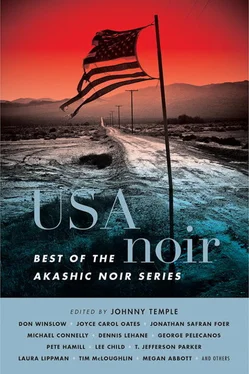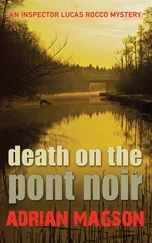Johnny Temple - USA Noir - Best of the Akashic Noir Series
Здесь есть возможность читать онлайн «Johnny Temple - USA Noir - Best of the Akashic Noir Series» весь текст электронной книги совершенно бесплатно (целиком полную версию без сокращений). В некоторых случаях можно слушать аудио, скачать через торрент в формате fb2 и присутствует краткое содержание. Город: New York, Год выпуска: 2013, ISBN: 2013, Издательство: Akashic Books, Жанр: Триллер, Детектив, на английском языке. Описание произведения, (предисловие) а так же отзывы посетителей доступны на портале библиотеки ЛибКат.
- Название:USA Noir: Best of the Akashic Noir Series
- Автор:
- Издательство:Akashic Books
- Жанр:
- Год:2013
- Город:New York
- ISBN:978-1-61775-189-9
- Рейтинг книги:3 / 5. Голосов: 1
-
Избранное:Добавить в избранное
- Отзывы:
-
Ваша оценка:
- 60
- 1
- 2
- 3
- 4
- 5
USA Noir: Best of the Akashic Noir Series: краткое содержание, описание и аннотация
Предлагаем к чтению аннотацию, описание, краткое содержание или предисловие (зависит от того, что написал сам автор книги «USA Noir: Best of the Akashic Noir Series»). Если вы не нашли необходимую информацию о книге — напишите в комментариях, мы постараемся отыскать её.
USA Noir: Best of the Akashic Noir Series — читать онлайн бесплатно полную книгу (весь текст) целиком
Ниже представлен текст книги, разбитый по страницам. Система сохранения места последней прочитанной страницы, позволяет с удобством читать онлайн бесплатно книгу «USA Noir: Best of the Akashic Noir Series», без необходимости каждый раз заново искать на чём Вы остановились. Поставьте закладку, и сможете в любой момент перейти на страницу, на которой закончили чтение.
Интервал:
Закладка:
Hattie went back inside without speaking to me, and she closed the black door hard. And Grady started to walk away, that familiar dipping lope that I’d watched for hours and hours while just behind him, that night.
I had to call a cab to get home. I went to Rio Seco the next morning in my Corsica. I thought I would see Grady Jackson there, or at the funeral, but I didn’t.
My father said to me, “You goin to Brazil? That far?” He shook his head. “You never fall in love with none of them place. Not one, no.”
I smiled and kissed him on the cheek. I sat all that night in my apartment, listening to Al Green, hearing the traffic on Echo Park Avenue, watching out my window as the palm fronds moved in the wind.
No one ever saw Grady Jackson again. I asked Hattie the following week, and the week after that, and then a month later. She was angry with me, and told me not to come back to the Golden Gopher. “You didn’t have to tell him,” she hissed.
“But he would have known someday,” I said.
“You know what?” she said, her fingers hard as a man’s on my wrist. “I loved my brother. I never loved nobody else in the world, but every day I saw my brother. I can’t never go back home, but he came to me. And you done took that away. You don’t know a damn thing about me or him.”
The next time I went to the bar, she was gone too.
I knew him. I figured he just started walking one day and never went back to Skid Row. Maybe he walked to Venice and disappeared under the waves. Maybe he walked all the way to San Francisco, or maybe he had a heart attack or died of dehydration, still moving.
That night, when we were young, when Grady left the car in Pomona, we walked down Mission Boulevard, leaving behind the auto shops and tire places, moving past vacant lots and tiny motor courts where one narrow walk led past doors behind which we could hear muffled televisions. Junkyard dogs snarled and threw themselves against chain-link. And we moved easy and fast, me just behind Grady. Walking for miles, past strawberry fields where water ran like mercury in the furrows. Walking past a huge pepper tree with a hollow where an owl glided out, pumping wings once and then gone.
That night, we walked like we lived in the Serengeti, I realized all those years later when I watched Grady disappear down 8th into the darkness. Like pilgrims on the Roman roads of France. Like old men in England. Like Indians through rain forests, steady down the trail. Fools craving movement and no words and just the land, all the land, where we left our footprints, if nothing else.
THE BOOK SIGNING
by Pete Hamill
Carmody came up from the subway before dusk, and his eyeglasses fogged in the sudden cold. He lifted them off his nose, holding them while they cooled, and saw his own face smiling from a pale green leaflet taped to the wall. There he was, in a six-year-old photograph, and the words Reading and Book Signing and the date and place, and he paused for a moment, shivering in the hard wind. The subway was his idea. The publisher could have sent him to Brooklyn in a limousine, but he wanted to go to the old neighborhood the way he always did, long ago. He might, after all, never come this way again.
The subway stairs seemed steeper than he remembered and he felt twinges in his knees that he never felt in California. Sharp little needles of pain, like rumors of mortality. He didn’t feel these pains after tennis, or even after speed-walking along the Malibu roads. But the pain was there now, and was not eased by the weather. The wind was blowing fiercely from the harbor, which lay off in the darkness to his right, and he donned his glasses again and used both gloved hands to pull his brown fedora more securely to his brow. His watch told him that he had more than a half hour to get to the bookstore. Just as he had hoped. He’d have some time for a visit, but not too much time. He crossed the street with his back to the place where the bookstore awaited him, and passed along the avenue where he once was young.
His own aging face peered at him from the leaflets as he passed, some pasted on walls, others taped inside the windows of shops. In a way, he thought, they looked like Wanted posters. He felt a sudden… what was the word? Not fear. Certainly not panic. Unease. That was the word. An uneasiness in the stomach. A flexing and then relaxing of muscles, an unwilled release of liquids or acids, all those secret wordless messages that in California were cured by the beach and the surf or a quick hit of Maalox. He told himself to stop. This was no drama. It was just a trip through a few streets where he had once lived but had not seen for decades. After seventeen novels, this would be his first signing in the borough that had formed him. But the leaflets made clear that here, in this neighborhood, his appearance might be some kind of big deal. It might draw many people. And Carmody felt apprehensive, nervous, wormy with unease.
“How does it feel, going back to Brooklyn?” Charlie Rose had asked him the night before, in a small dark television studio on Park Avenue.
“I don’t know,” Carmody said, and chuckled. “I just hope they don’t throw books at me. Particularly my own books.”
And wanted to add: I’ve never really left. Or to be more exact: Those streets have never left me.
The buildings themselves were as Carmody remembered them. They were old-law tenements, with fire escapes on the façades, but they seemed oddly comforting to Carmody. This was not one of those New York neighborhoods desolated by time and arson and decay. On the coast of California, he had seen photographs of the enrubbled lots of Brownsville and East New York. There were no lots here in the old neighborhood. If anything, the buildings looked better now, with fresh paint and clear glass on the street-level doors instead of hammered tin painted gray. He knew from reading the New York Times that the neighborhood had been gentrified, that most of the old families had moved away, to be replaced by younger people who paid higher rents. There was some unhappiness to all of that, the paper said, but still, the place looked better. As a boy he had walked these streets many times on nights like this, when most people retreated swiftly from the bitter cold to the uncertain warmth of the flats. Nights of piled snow and stranded streetcars. Now he noticed lights coming on in many of those old apartments, and shadows moving like ghosts behind drawn shades and curtains. He peered down a street toward the harbor, noticed some stubborn scabs of old snow, black between parked cars, and in the distance saw a thin scarlet band where the sun was setting in New Jersey. On this high slope, the harbor wind turned old snow into iron. But the sliver of sun was the same too. The day was dying. It would soon be night.
If the buildings were the same, the shops along the avenue were all different. Fitzgerald’s bar was gone, where his father did most of his drinking, and so was Sussman’s Hardware and Fischetti’s Fruit and Vegetable and the Freedom Meats store and the pharmacy. What was the name of that drugstore? Right there. On that corner. An art supply store now. An art supply store! Moloff’s . The drugstore was called Moloff’s, and next door was a bakery. “Our Own” they called it. And now there was a computer store where a TV repair shop once stood. And a dry cleaner’s where men once stood at the bar of Rattigan’s, singing the old songs. All gone. Even the old clock factory had been converted into a condominium.
Читать дальшеИнтервал:
Закладка:
Похожие книги на «USA Noir: Best of the Akashic Noir Series»
Представляем Вашему вниманию похожие книги на «USA Noir: Best of the Akashic Noir Series» списком для выбора. Мы отобрали схожую по названию и смыслу литературу в надежде предоставить читателям больше вариантов отыскать новые, интересные, ещё непрочитанные произведения.
Обсуждение, отзывы о книге «USA Noir: Best of the Akashic Noir Series» и просто собственные мнения читателей. Оставьте ваши комментарии, напишите, что Вы думаете о произведении, его смысле или главных героях. Укажите что конкретно понравилось, а что нет, и почему Вы так считаете.












